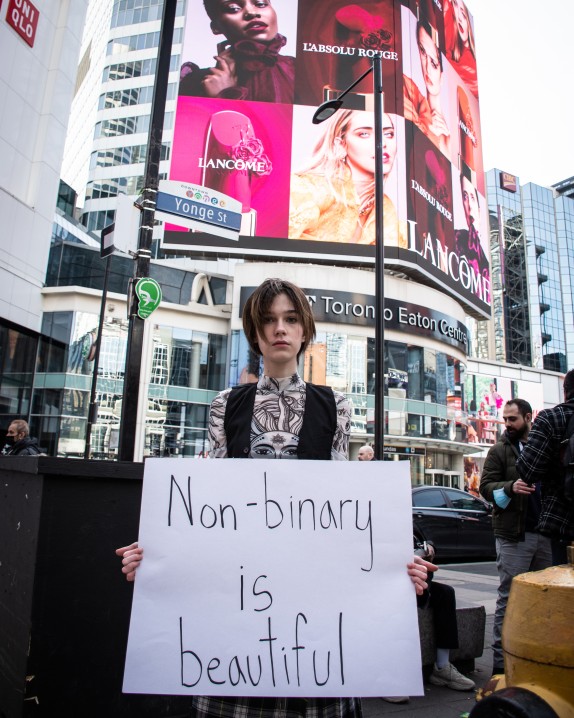Vaughan / Canada
“Today, my mom asked me if I had a more challenging time coming out as non-binary than when I first came out as trans-masculine. My automatic response was ‘no,’ but I immediately began to question why that was.
‘They/them’ is a concept that strays from society’s ingrained perception of gender; it wouldn’t be crazy to assume others would find it difficult to adjust to my pronouns. So why couldn’t I think of one significant moment where it had been an issue? Then, it struck me.
You see, I had—have—the privilege of growing up in a household without binary language and heteronormativity enforced upon me. As a kid, I don’t think I even understood the significance of gender or what was ‘socially acceptable’ for expression. It wasn’t until grade 4, when I cut my hair short for the first time, and my class made fun of me and said I looked like a boy, that I understood.
Don’t let age fool you; kids can be cruel, especially to those who stray from their ideas of ‘normal.’ I don’t blame them. They’re kids. It’s hard for them to know better if they haven’t been taught otherwise. Nevertheless, the relentless teasing hurt; badly.
I developed anxiety and extreme panic attacks before the age of 10. I carried my dysphoria into my transition as a boy—even after we switched schools to a much more accepting environment.
It wasn’t until middle school—grade 6—I found my clarity. The situation was rather comical; I was at a friend’s place and stumbled upon an Instagram post about they/them pronouns. The next thing I knew, I was sending a text to my mom, breaking the news that I was not—in fact—a boy but non-binary. Her reply was, quote, ‘I’m already practicing.’
It was smooth sailing from then on. My friends accepted me, my school was respectful and informed my teachers, and my family was supportive. For the most part, the school board policies aim to recognize and support gender and sexual diversity of its students. Comparatively, they do. There’s still work to do regarding zero-tolerance policies, though. Queer students are often swept up in these policies and punished along with their harassers. My high school recently had a student walkout regarding this issue. While the school board has good intentions, following through has its pros and cons. This well-meaning but awkward energy has carried into high school, where most of my new friends are also Queer.
While this environment became my norm, but I’ve realized how lucky I was. This may have been my normal, but it was a privilege compared to the lives of many struggling Queer kids.
That I could not think of a distinct negative memory revolving around my non-binary identity is because the overflowing support I’ve received has ultimately outweighed the bad. This is a right every Queer person deserves, where their negative experiences don’t revolve around their Queer identity.
I used to think my experience was mundane, but from a global perspective, it’s unique. My wish is that one day Queer kids can share similar stories to mine and that our journeys become a normalized part of society.”




